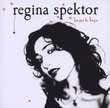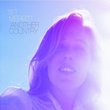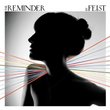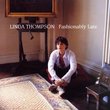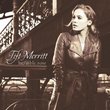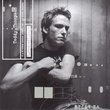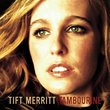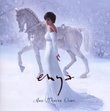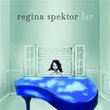| All Artists: Regina Spektor Title: Begin to Hope Members Wishing: 0 Total Copies: 0 Label: Sire Original Release Date: 1/1/2006 Re-Release Date: 6/13/2006 Album Type: Limited Edition, Special Edition Genres: Alternative Rock, Folk, Pop, Rock Styles: Contemporary Folk, Singer-Songwriters, Adult Alternative Number of Discs: 2 SwapaCD Credits: 2 Other Editions: Begin to Hope UPCs: 093624431527, 093624431565 |
Search - Regina Spektor :: Begin to Hope
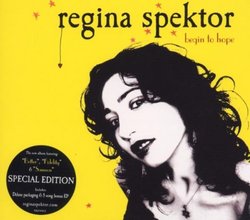 | Regina Spektor Begin to Hope Genres: Alternative Rock, Folk, Pop, Rock
Regina Spektor?s last album, 2004?s Soviet Kitsch, garnered praise from Time, Rolling Stone, Spin, Vanity Fair, The New York Times and many others. But this Russian-born, Bronx-bred singer-songwriter-pianist, who emerged f... more » |
Larger Image |
CD DetailsSynopsis
Album Description Regina Spektor?s last album, 2004?s Soviet Kitsch, garnered praise from Time, Rolling Stone, Spin, Vanity Fair, The New York Times and many others. But this Russian-born, Bronx-bred singer-songwriter-pianist, who emerged from the NYC café circuit, continues to expand her vision. On Begin To Hope, produced by David Kahne (The Strokes, Sublime, Sugar Ray), she broadens here palette with electric guitar, drum machines and seductive electronic loops, finding new canvases for her provocative vocal style. Hope for pop has arrived with Regina Spektor. Similar CDs
Similarly Requested CDs
|
CD ReviewsThere's still hope E. A Solinas | MD USA | 06/24/2006 (4 out of 5 stars) "In her previous three albums, Regina Spektor specialized in quirky anti-folk. Piano, odd melodies and poetic lyrics. But Spektor tries a new sound in her long-awaited fourth album, "Begin to Hope." Instead of anti-folk, her music here is more polished and poppier... or perhaps it's anti-pop. Either way, while this album has its middling moments, most of the songs are still Regina Spektor at her best. It kicks off with the oddball "Fidelity," a trilling little song with the piano edged in synth. Spektor doesn't fare quite as well in the second one, which sounds too generic for her talents -- guitar pop with only a dash of piano, and only a few of her vocal flourishes. But then the album changes, as if Spektor feels she's done enough "typical" pop. Instead she switches to the soft-edged piano melody of "Samson" ("You are my sweetest downfall"), followed by a strong string of songs that stick to her strengths: piano anti-folk (or anti-pop), and songs that don't sound like anything "On the Radio." Instead she leans on soft piano ballads, silky piano folk and jagged little rock songs. Songs like "Edit" and "20 Years of Snow" are pure Spektor, with the cascading piano melody and the quirky singing, while "That Time" is a strange, mocking little rocker about reading Shakespeare and burying bits of a cat's body. The finale is a quiet, meditative song about loneliness in the city, and missing the one you love. For anyone who misses a lover, this will be a heart-tugger. And the special edition has a bonus EP, perhaps for fans who adore her quirkier side. There are the bittersweet piano ballads like "Another Town" ("my soul feels so old!"), the bittersweet "Baobabs" and "Dusseldorf." And then there is quirk supreme: "Uhmerica," which has her uttering an explosive grunt through the chorus, and the kinetic weirdness of "Music Box." Yes, the cry is that Spektor has gone commercial -- there's more guitar on this album, and little washes of synth. But the heart of her music has always been the piano, odd melodies and unusual singing -- and though this is a bit more polished than her prior work, the brilliance is still there. And remember, the music is what we came here to hear. Once you get past the lackluster second song, Spektor's piano music is back -- she can do it slow and soft, or fast and jagged. And she's backed by some solid enough drums that get to go wild in "Hotel Song." And what about the synth? It bobbles along in the background... and actually enhances the piano. Spektor's offbeat voice is just as versatile as her piano -- she sounds sweet in the ballads, quirky in the faster songs. She rattles off the strangely written songs ("the words float out like holograms") as she sings of loneliness, love and eating tangerines. "Be afraid of the cold/They'll inherit your blood/Apres moi, le deluge/After me comes the flood..." she croons. Regina Spektor had a lot to live up to after the brilliance of "Soviet Kitsch," and for the most part she does. A bittersweet gem of anti-folk... and anti-pop." Funky, Cool & Fun Marion | Louisiana | 01/30/2007 (5 out of 5 stars) "I don't buy many CD's but I saw Regina Spektor on a morning news show recently and was mesmerized by her voice, her life and her poetry/lyrics. I tried to resist, but finally gave in and purchased this CD. I was not disappointed! I like every song on it. It's so rare to hear a truly original soul anymore who isn't prepackaged and tied with a pretty bow by media mogols, but this CD is NOT your average music. It's funky, cool, fun and unique. Her voice is as much an instrument as her piano and she plays it with abandon. If you march to the beat of a different drummer, you will LOVE Regina's music. I can't wait to hear more." Sweet voice, beautiful piano, great recording! K. Sullivan | Virginia - United States | 01/19/2007 (5 out of 5 stars) "I now realize that Regina Spektor is not new to the music scene, but she is new to me. I am thrilled to have discovered her! "Begin to Hope" is a tremendous album.
Thanks to VH1 for playing "Fidelity" practically every morning. For a week or so I tuned in just hoping to see her video. I finally decided I had to try her ablum relatively sound unheard. Taking that chance was a great decision. First, in my opinion, Regina has the sweetest voice you will ever hear. I could listen to it all day and not tire of it. Second, add to that her piano playing, and you have a very powerful combination. She sings and plays with such flair and artistry. She is extremely talented (all this and cute, too). She makes use of varying styles: folk, classical, pop, and even hints of soul, blues, and jazz. And she does it all meticulously and beautifully. The instrumentation is generally sparse, her voice and piano are featured, while some songs are "fuller" than others. The mood ranges from fun to reflective. She impresses me as being intelligent and witty with her creative use of voice and piano. The lyrics are thoughtful, poignant even. Certainly this CD isn't for everyone. There is no headbanging or club dancing. But if you have a taste for non-rhythm driven music, this recording is fabulous. For the right taste, this album positively hits the spot. Highly recommended!" |

 Track Listings (12) - Disc #1
Track Listings (12) - Disc #1
